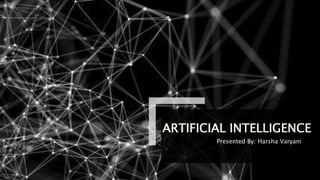
Artifical Intelligence
- 1. ARTIFICIAL INTELLIGENCE Presented By: Harsha Varyani
- 2. Contents ■ Introduction to AI ■ History of AI ■ Types of AI ■ Agents in AI ■ Technologies in AI ■ Application of AI ■ Pros and Cons of AI ■ Future of AI ■ Conclusion
- 3. Introduction to AI ■ What is AI ■ Why AI is needed ■ How does AI react to different situations ■ Stages of AI development – Computational intelligence – Perceptual intelligence – Cognitive intelligence ■ Languages in AI – LISP, PROLOG, SmallTalk , R, Python, Many more… ■ Real world examples of AI
- 4. History of AI ■ Starting Period (1950’s to early 1960’s) ■ Rising Period ( in 1960’s) ■ Low Development Period (1970’s to 1980’s) ■ Steady Development Period(1980’s to 1990’s) ■ Booming Period(21st century )
- 6. Types of AI Based on Ability Based on Functionality ■ Reactive Machine ■ Limited Memory ■ Theory of Mind ■ Self-Awareness ■ Narrow AI ■ General AI ■ Super AI
- 7. Types of AI – Based on Ability ■ Narrow AI: Narrow AI is a type of AI which is able to perform a dedicated task with intelligence – E.g. Siri, playing chess, speech recognition ■ General AI: General AI is a type of intelligence which could perform any intellectual task with efficiency like a human. – E.g. Iron man movie the robot suites that are fully capable of doing thing that a human can do ■ Super AI: Super AI is a level of Intelligence of Systems at which machines could surpass human intelligence, and can perform any task better than human with cognitive properties. We are here
- 8. Types of AI – Based on functionality ■ Reactive machine: These machines only focus on current scenarios and react on it. It doesn't stores memory or any past experience – E.g. IBM deep blue system, Google Alpha Go system ■ Limited Memory : These machines can store past experiences or some data for a short period of time. – E.g. Self driving car ■ Theory of Mind: These machines can understand the human emotions, people, beliefs, and be able to interact socially like humans. ■ Self Awareness: These machines will be super intelligent, and will have their own consciousness, sentiments, and self-awareness.
- 9. Agents in AI ■ What is Agent in AI – Runs through cycle of perceiving, thinking, and acting ■ Who can be agent – Human-Agent – Robotic Agent – Software Agent ■ Basic terminology – Sensors – Actuator – Effectors precepts Action Sensors Effectors
- 10. Agents in AI ■ How it works – Structure of AI Agent: Agent = Architecture + Agent program – AI Agent works on PEAS type of model – P: Performance measure , E: Environment, A: Actuators, S: Sensors ■ Example of self driving car in PEAS model – Performance: Safety, time, legal drive, comfort – Environment: Roads, other vehicles, road signs – Actuators: Steering, accelerator, brake, signal, horn – Sensors: Camera, GPS, speedometer, sonar.
- 11. Key Technologies of AI ■ Computer Vision Technology ■ Machine Learning ■ Natural Learning Process(NLP) ■ Human Computer Interaction ■ Virtual Reality ■ Augmented Reality
- 12. Application of AI ■ Medical ■ Educational ■ Finance Field ■ Smart Home ■ Manufacturing ■ E-commerce ■ Gaming
- 13. Pros of AI ■ Reduction in human error ■ Zero risk ■ 24x7 availability ■ Digital assistance ■ Unbiased decisions
- 14. Cons of AI ■ High Costs ■ No creativity ■ Increase in unemployment ■ Makes humans lazy
- 15. Future of AI ■ Help us improve the cyber security ■ Helpful for day to day task ■ Transportations ■ Increase in speed of development
- 16. Conclusion ■ AI is being widely used in modern life style. This determines the AI technology can also bring more changes to modern society ■ As of now the AI researches are quite small it has long way to go ■ The researcher are free to go forward with there own way because there is no existing formalism in the field yet. ■ AI systems can bring an innovation to all problem solving processes and increase their effectively.
- 18. References ■ https://ieeexplore.ieee.org/document/9274952 ■ https://ieeexplore.ieee.org/document/4804025 ■ https://www2.deloitte.com/us/en/pages/consulting/articles/the- future-of-ai.html ■ https://machinelearningmastery.com/natural-language-processing/ ■ https://www.iberdrola.com/innovation/virtual-reality ■ https://www.cio.com/article/3235992/8-artificial-intelligence- technologies-your-enterprise-needs-today.html ■ https://www.ibm.com/topics/computer-vision ■ https://www.mygreatlearning.com/blog/artificial-general-intelligence/